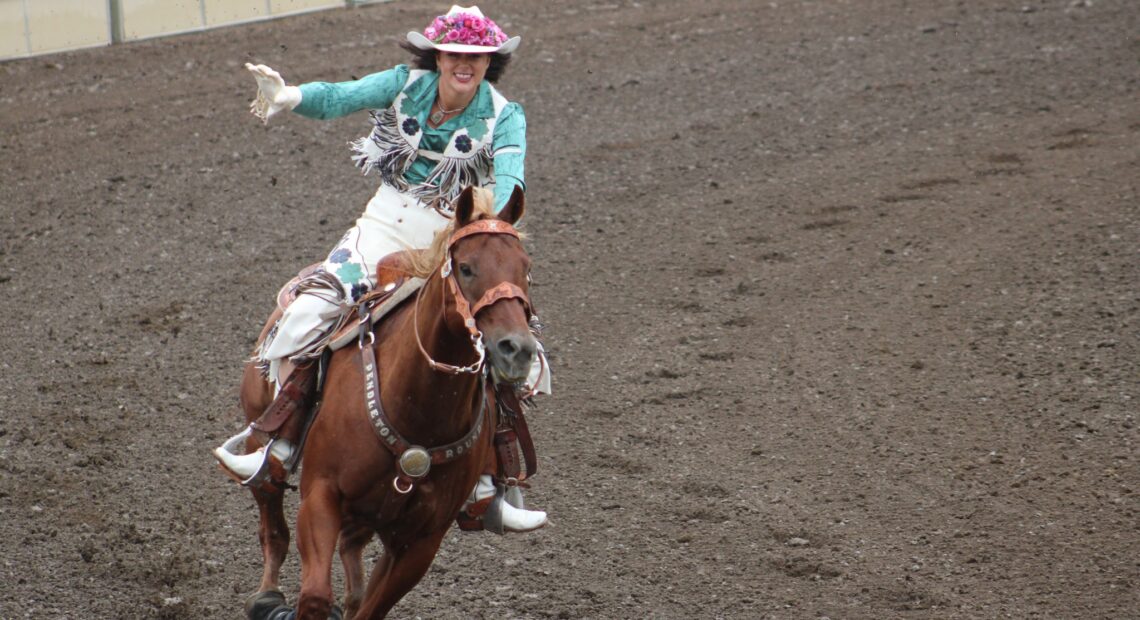
Pendleton Round-Up crowns first Native queen in 71 years
Listen
(Runtime 1:06)
Read
When Kayla Fossek walks through the grounds of the Pendleton Round-Up, wearing white leather chaps and a flower-covered cowboy hat, she’s hard to miss. People often stop her to chat, take photos or simply share their congratulations.
She is, after all, rodeo royalty.
Fossek, 23, is this year’s Round-Up Queen. A descendant of the Confederated Tribes of the Umatilla Indian Reservation, Fossek is the first Native American to hold the title since 1953.
“I get emotional whenever I talk about it,” Fossek said. “I’m fulfilling more than just my own dreams by holding this title.”
The Pendleton Round-Up has been held annually since 1910. Each September, the rodeo draws tens of thousands of visitors to a remote corner of eastern Oregon.
“It has its own culture,” Fossek said of the Round-Up. “When you come here you can feel it, the traditions run so deep.”
Fossek, a graduate of Pendleton High School, is now steeped in that culture. At 16, she started working for Toni Minthorn, a professional horsewoman and coach of the Round-Up Court.
A few years later, Fossek tried out to be a princess for Happy Canyon, the rodeo’s evening show. She was selected to the all-Native court after completing an interview and a riding test. In 2020, she was named a princess on the Round-Up Court, a position she held for two years due to the Covid-19 pandemic.
Becoming the Round-Up Queen makes her the first person to have held all three titles.
“This community has done so much to lift me up and allow me to become more than I ever thought I could be,” Fossek said. “Little me would be in shock at the kind of person that we grew into.”
Since being named queen last fall, Fossek and her princesses have traveled to events, rodeos and schools around the region, generating excitement for the Round-Up. They also have spent many hours practicing for the run-in: the thrilling moment when they sprint into the stadium on horseback and kick off the rodeo. Fossek rides Red, a dark sorrel gelding with a flaxen mane and tail.
The members of the Round-Up Court aren’t paid for their duties, though the rodeo covers their travel expenses and leatherwear.
While preparing for this year’s event, Fossek also was studying and working full time. (She plans to become a nurse.) There were many days when she’d leave the house at 6 a.m., work a full day followed by Round-Up practice, only to start homework at 9 p.m.
“You just grit your teeth, cowgirl up and get it done,” she said. “I wasn’t gonna let anything stop me from having this once in a lifetime opportunity.”
Becoming a part of the Round-Up Court also has helped Fossek connect with her Native American roots. While growing up, she hunted, fished and attended a few powwows, but said she never felt immersed in her tribal culture.
The Round-Up, she said, “opened up this whole world to me that I had no clue about.” For one thing, Fossek learned that 18 women on her father’s side also had been members of the Happy Canyon court.
Getting in touch with her Native identity has made Fossek appreciate the Round-Up even more, she said. “There’s this whole other side of me and this whole other sense of pride that I have everywhere I go, just remembering who I am and where I come from.”
















